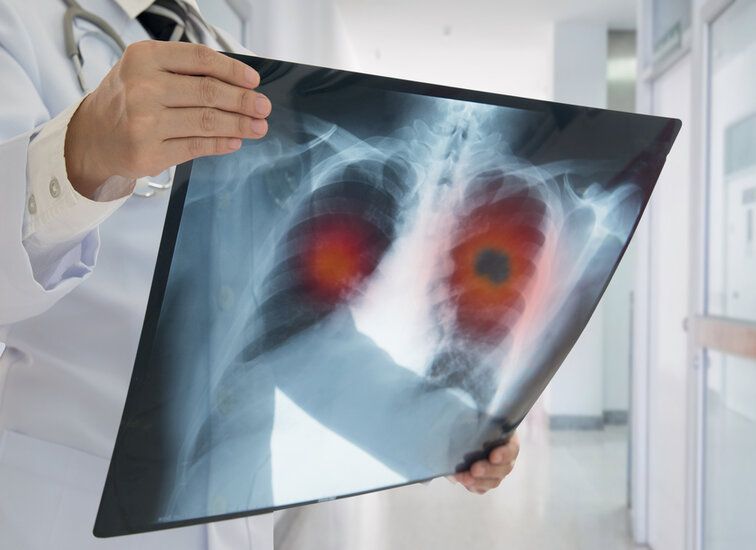Could targeted steroid use offer a universal complimentary treatment to fight TB?
Posted on: 09 October 2025
Researchers wanted to understand how steroids selectively affect human macrophages, which are a key cellular player in the immune response to Mycobacterium tuberculosis (Mtb); the bacteria which causes TB.
Tuberculosis (TB) remains a major global health challenge, affecting over 10 million people annually worldwide, with 1.25 million people dying of TB every year. While steroids like dexamethasone are used in certain TB cases (e.g., TB meningitis), their impact on immune cells is not well understood. Given the renewed interest in the steroid dexamethasone, as a host-directed treatment during the COVID-19 pandemic, the Trinity College Dublin team - based at St James’s Hospital, Dublin - provides evidence that treating patients with steroids may enhance the function of their macrophages to kill the mycobacteria, while diminishing pathways of inflammatory damage. The study is published now in the journal Scientific Reports. The team’s goal was to determine whether dexamethasone impacts the macrophage’s ability to fight TB. Although glucocorticoids can reactivate TB, they are paradoxically the only adjunctive host-directed therapies that are recommended by the World Health Organisation for TB. Steroids are given to patients alongside antimicrobials in certain circumstances, however, scientists don’t fully understand the effect of these drugs on the immune system, especially innate immune cells such as macrophages.
The team’s goal was to determine whether dexamethasone impacts the macrophage’s ability to fight TB. Although glucocorticoids can reactivate TB, they are paradoxically the only adjunctive host-directed therapies that are recommended by the World Health Organisation for TB. Steroids are given to patients alongside antimicrobials in certain circumstances, however, scientists don’t fully understand the effect of these drugs on the immune system, especially innate immune cells such as macrophages.
The researchers studied immune cells called macrophages derived from the blood of healthy volunteers or isolated from lung fluid donated by patients undergoing routine bronchoscopies. By treating and infecting these macrophages in the lab with Mtb, the scientists could examine and understand how dexamethasone affects the immune response that protects the lungs during infection.
Key findings from the study
- Dexamethasone a potent glucocorticoid reduces glycolysis in human lung and blood derived macrophages. This reduces the amount of energy available in the cell.
- Dexamethasone reduced the production of both pro and anti-inflammatory cytokines measured in the study, IL-1β, TNF, IL-6, IL-8 and IL-10. Although helpful for immunity, limiting the production can also limit damage from excessive inflammation.
- Mtb-infected macrophages have increased survival when they were treated with dexamethasone. This suggests that dexamethasone may protect macrophages from dying due to the harmful effects of infection or detrimental immune responses to infection.
- Dexamethasone reduces bacterial burden in infected macrophages, and we have identified that this is at least partly mediated by autophagy and phagosomal acidification. Dexamethasone can enhance the macrophages’ ability to degrade and clear bacteria helping to overcome infection with Mtb.
This study identifies that macrophages from different sources have differential responses to glucocorticoids. This highlights that tissue origin can influence how macrophages react to drugs, which may be important for targeting treatment strategies. This is one of the first studies to show that dexamethasonecan reduce inflammation while preserving or enhancing antimicrobial function in primary human lung macrophages infected with Mtb.
How could this research change a patient’s life?
The findings support the use of steroids as an extra therapy in conjunction with existing antimicrobial therapies in TB treatment, especially in cases with excessive inflammation. Steroids might also be useful with antimicrobials in TB preventative therapy, to reduce progression from latent TB infection to active TB disease. This study opens avenues for macrophage-targeted steroid therapies that balance inflammation control with antimicrobial defence.
For now, researchers hope this study will hasten the recovery of TB patients who experience debilitating symptoms, often for months into existing therapy.
Dr Donal Cox, Senior Research Fellow, Clinical Medicine, Trinity College Dublin said:
“Our study shows that dexamethasone, which is known to dampen inflammation, can also help macrophages fight tuberculosis more effectively. This challenges the assumption that steroids always suppress immunity and opens the door to smarter, targeted adjunctive therapies that balance inflammation control with antimicrobial defence.”
Prof Joseph Keane, Professor of Medicine, Trinity College Dublin and Consultant Respiratory Physician, St James Hospital said:
“In clinical practice, steroids are the most under-used adjunctive therapy for TB. We often rely on steroids to manage inflammation in tuberculosis, particularly in severe forms like TB meningitis. What’s reassuring from this study, is that dexamethasone not only tempers inflammation but also appears to support the macrophage’s ability to control infection. This study provides new evidence to help us redefine steroid use in TB care—targeting inflammation without compromising antimicrobial defence.”
Next steps for this research
Developing steroid therapies that can be specifically targeted to lung macrophages via mechanisms such as inhaled nanoparticles might be an option to translating this into better therapy. The team also wants to identify how steroids altered different metabolic pathways in human lung macrophages and not in blood derived macrophages so they can exploit this to make steroid therapies better in the future.
This study was generously funded by Royal City of Dublin Hospital Trust.
READ: You can read the newly published paper: "Dexamethasone inhibits Mycobacterium tuberculosis-induced glycolysis but preserves antimicrobial function in primary human macrophages" in the journal Scientific Reports at this link: https://www.nature.com/articles/s41598-025-20188-2
Media Contact:
Ciara O’Shea | Media Relations | coshea9@tcd.ie | +353 1 896 4204
